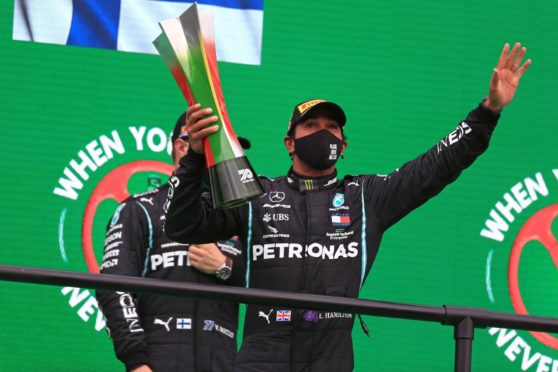They were two men who were born within a week of one another in October 1923.
And, although there were contrasts between the style and temperament of rugby’s Bill McLaren and motorsport’s Murray Walker, who died at the weekend, aged 97, there is no denying that these fellows were broadcasting legends in their different domains, who never forgot the scenes they witnessed during the Second World War.
Walker, one of life’s effervescent souls, spoke later about his military service after graduating fron Sandhurst, which included driving a Sherman tank at the Battle of Reichswald with the 4th Army Brigade.
The ebullient McLaren, for his part, served with the Royal Artillery in Italy during the conflict, fought at the Battle of Monte Cassino, and was subsequently confronted by a mound of 1,500 corpses in a churchyard: an experience which never left him.
As he recalled, prior to his death in 2010: “Somehow, this pitiless slaughter encapsulated the greater conflict into which we had been dragged. It was a glimpse of hell on earth, and we were right in the middle of it, watching our chums, our enemies and innocent civilians alike losing their lives right in front of us.
“Here were simple people, leading ordinary, decent lives, suddenly thrust into terrible violence which snuffed out those lives in an instant. For weeks afterwards, I could not get that shocking image out of my mind, nor the stench of decaying bodies out of my nostrils. The boy I had been was gone.”
In the aftermath of their wartime exploits, both men stumbled into the role of commentary almost by accident. Walker became a renowned advertising executive, responsible for such memorable slogans as “Opal Fruits: Made to make your Mouth Water”, and he and his father, Graham, were keen devotees of motorcycling and bikes.
Yet gradually, he earned approbation from the wider public for his enthusiasm and expert knowledge of life in the pit and paddock. He could mingle as effortlessly with the greats in his domain as McLaren after the Scot survived a close brush with death in surviving tuberculosis before studying PE in Aberdeen and becoming a teacher.
In the 1950s and 1960s, the BBC was determined to uncover broadcasters who could preach to the uncoverted and attract a new sporting audience and this duo were part of the process which also delivered John Arlott’s fabled burr to Test Match Special and Dan Maskell’s patrician tones at Wimbledon where he always seemed to be on the verge of popping away from the microphone to enjoy strawberries and Pimm’s.
Hawick-born Bill gained a battalion of global fans for his evocative descriptive powers. Some players were “rampant stags”, others “mad giraffes”, a kick might “hirple” through the posts, an elusive scrum-half was “as slippery as a baggy in a Borders burn” and an outbreak of fisticuffs was a “wee bit of argy-bargy”. And listeners lapped this up from Dunbar to Durban, and Wellington to Wick.
They were equally enthralled by Walker’s pants-on-fire descriptions of Formula One as it established an international reputation and while his “Murrayisms” have become part of his enduring charm, he could be forgiven the occasional gaffe, given the difficulty of communicating exactly what is a happening in a race where the participants are often travelling at more than 200mph.
You needed to scream out the words for the full effect: “This leading car is absolutely unique – except, of course, for the one immediately behind it, which is identical.” Or “Mansell’s now totally in front of everyone in this race, except the two in front of him.”
Yet, in their own ways, Bill and Murray were both utterly unique voices and there’s a good reason for that. They had alternative lives before sport and pursued their careers distinct from their broadcasting duties. They had both been immersed in genuine tragedy and disaster away from the field and the race circuit, so they had a perspective on how much Test games and Grands Prix mattered in the bigger scheme of things.
This didn’t mean they were flippant about sport. I still recall the joy on McLaren’s face when his former pupil, Tony Stanger, scored the decisive try in the 1990 Grand Slam tussle with England at Murrayfield. And I remember how difficult Walker found it to keep his emotions in check when Damon Hill became world champion in 1996.
But they had a hinterland beyond fun and games and flying wingers and fast cars. And Walker never quite shook off the terrible circumstances in which Ayrton Senna perished at Imola in 1994 on a desperate weekend for F1.
He recalled: “The greatest racing driver in the world was lying immobile and gravely injured beside the track. I had no way of knowing how serious his condition was although I was by now fearing the worst. What to do?
“For what seemed like hours, the horrible scenes continued until a helicopter took the mortally wounded Brazilian to the hospital, where he died. A truly great man had met his maker and I honestly do not know how I found the right words to cope with it.”
That’s the thing, though. He did find the right words. So, invariably did Bill. And that is why we feel sad whenever these luminaries slip into the ether.
